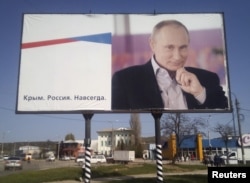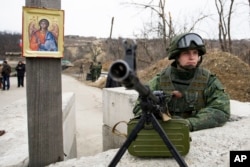With U.S. lawmakers expected to finalize new sanctions on Russia this week, former NATO Supreme Commander James Stavridis told VOA that would be a positive move, since he believes President Donald Trump's administration has taken too weak a stance on Russia.
In an interview Tuesday with VOA's Jela De Franceschi, Stavridis, now dean of the Fletcher School of Law and Diplomacy at Tufts University, said additional sanctions on Russia would be "appropriate, measured and make enormous sense, given the level of egregious behavior we have seen from Vladimir Putin's Russia."
"Strong sanctions are necessary," Staviridis said, listing Russia's offenses: interfering with the U.S. election; supporting Syrian leader Bashir al-Assad, whom he calls a war criminal; and, "worst of all," invading Ukraine and annexing Crimea.
Trump "has not been sufficiently strong in his approach to Putin, to Russia," Stavridis said, and thus it is appropriate for Congress to levy new sanctions.
Asked about how the United States and Russia can cooperate, Stavridis said the two superpowers could still collaborate on counterterrorism, fighting Islamic State and suppressing the illegal narcotics trade. Afghanistan might also be an area where Washington and Moscow can cooperate, he added.
The United States and Russia also can improve relations through their mutual membership in international organizations, Stavridis said, such as the NATO-Russia Council; the Arctic Council, which promotes better coordination among the Arctic states; and the United Nations Security Council.
The more the United States and Russia interact, he added, the better the chances that they can prevent a recurrence of the Cold War.
"On the other hand," Stavridis noted, "the United States has fundamental interests and a global leadership goal that would require it, at times, to confront Russia on inappropriate international behavior."
The most important area where the United States and Russia can find common ground, the former Western alliance commander said, is in Europe, where NATO faces Russian activity on its borders, beginning in Ukraine. The top challenge is avoiding a confrontation between NATO and Russian military forces, he added.
"We need to avoid anything that would lead to escalation," Stavridis said.
Ukraine represents a particular challenge, he told VOA: "We've seen here an invasion [of eastern Ukraine by pro-Russian forces], an annexation [of Crimea]. Unless the Minsk agreement is fully implemented, I see very challenging times ahead for Russian-European relationships, and the United States is very much a part of that because of the trans-Atlantic relationship."
Admiral Stavridis discussed these issues in an interview with VOA's Serbian service.






